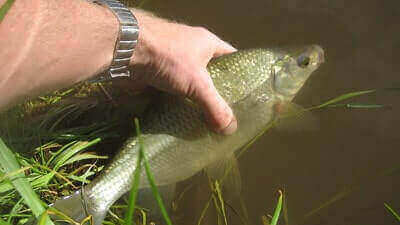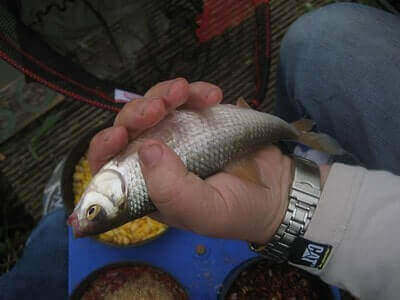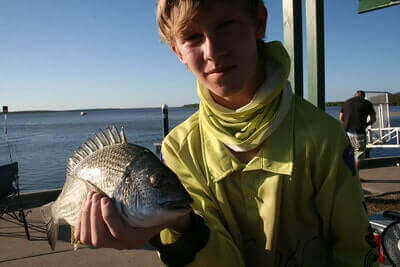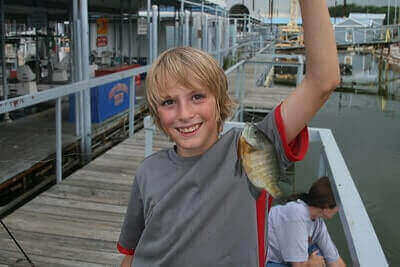Disclosure: We may earn commissions if you purchase products after clicking on a link from our site.
Would you like to learn how to catch bream? Bream is one of the most abundant and easiest fish to catch. It is a member of the Sunfish family in the United States. Bream is a good fish to teach beginners how to fish. In this article, we share information, fishing techniques, and tips to help you catch more bream.

Table of Contents
- 1 How To Catch Bream
- 2 1. Casting
- 3 2. Fly Fishing
- 4 3. Still Fishing
- 5 4. Drifting
- 6 5. Trotlining
- 7 Bream Tackle Setup
- 8 How To Catch Bream From Shore
- 9 How To Catch Bream on Lures
- 10 How To Catch Bream In A River
- 11 How To Catch Bream At Night
- 12 How To Catch Bream In A Lake
- 13 How To Catch Bream In Summer
- 14 Best Bait For Bream
- 15 Bream Fishing Tips
- 16 The Bottom Line
How To Catch Bream
1. Casting
Casting is a more active approach to bream fishing, where anglers use lightweight spinning or baitcasting tackle to cast small lures or bait rigs to specific areas where bream is likely to be found. This method allows anglers to cover more water and target bream in various habitats, such as along shorelines, around vegetation, or near underwater structures. Popular lures for casting include small jigs, spinners, soft plastics, and small crankbaits. Anglers can vary their retrieval speed and presentation to entice bream to strike.
2. Fly Fishing
Fly fishing for bream can be both challenging and rewarding. Anglers use specialized fly rods, lines, and flies to mimic natural insect prey that bream feeds on, such as mayflies, caddisflies, or aquatic insects. Fly fishing for bream often involves delicate presentations and precise casting to target specific feeding areas, such as shallow flats, weed beds, or along the edges of structures. Flies such as poppers, foam spiders, nymphs, and small streamers can all be effective for enticing bream to bite.
3. Still Fishing
Still fishing is one of the most traditional and straightforward methods for catching bream. Anglers typically use a rod and reel combo with a basic rig, such as a bobber or a bottom rig, baited with live bait like worms, crickets, or small minnows.
The angler casts the baited rig into the water and waits for a bream to take the bait. This method is effective when targeting bream near submerged structures, such as fallen trees, docks, or weed beds, where they often congregate to feed.
4. Drifting
Drifting is a technique commonly used in larger bodies of water, such as lakes or reservoirs, where bream may be scattered over a wide area. Anglers drift with the wind or current while presenting bait or lures to bream along their drift path.
This method allows anglers to cover a large area and locate schools of bream that may be actively feeding. Drifting can be effective with live bait under a float or with small jigs or soft plastics worked along the bottom.
5. Trotlining
Trotlining is a method commonly used by experienced anglers to target bream, particularly in larger bodies of water with stable populations. It involves setting a long main line with multiple baited hooks attached at intervals along the line.
The line is then suspended across a body of water, such as a river or lake, using buoys or floats to keep it afloat. Bream swims along the line, encountering the baited hooks, and are hooked when they take the bait. Trotlining requires careful setup and attention but can yield large numbers of bream when executed correctly.
Bream Tackle Setup
Bream can be caught with any regular tackle. Cane poles and light spinning tackle. Cane poles are long poles with no reel. The line is usually tied to the stick or pole or it is tied to an eye on the end of the pole. When rigging a cane pole, use an 8- to 10-lb test. use a bobber and a small thin wire hook in the size range from 6/0 to 10/0.
A 5 to 6 feet light spinning rod with a reel rated for a 2 to 8-pound test line will work for bream fishing. Hooks in the size of 8/0 to 10/0 will work. Use a bobber or a spinner.

How To Catch Bream From Shore
Bream likes structures that give them cover from predators and also that they can hide in to ambush their prey. When fishing for bream from the shore, look for structures like weed beds, brush piles, boat docks, fallen trees, riprapped banks, stumps, and other covers.
Cast out into the water and when you get a strike, reel in the fish. One technique is to cast on the bank and jump the bait or lure into the water. This attracts the attention of Bream when a popping bug or cricket acts like this or when a spinner leaps from the bank and swims away.

How To Catch Bream on Lures
Lures can be used to fish for bream. You can use lures to cast into the water and reel in when you get a bite. Look for structures like weed beds, brush piles, boat docks, fallen trees, riprapped banks, stumps, and other covers to drop your lure around and try to get strikes from bream. When on a boat, you can drop the lure into the water and slowly reel it up. Topwater plugs, spinnerbaits, crankbaits, and plastics are some of the lures that can be used to catch Bream.
How To Catch Bream In A River
When fishing for bream in a river, look for fallen trees, stumps, weed beds, brush piles, and other covers that bream may be hiding around. Drop your bait or lure in and when you get a strike, reel in the fish.
Chumming is a fishing technique that can be used to get the attention of Bream. You can drop tiny baits of cut bait into the river to get the attention of the fish and then send in your bait on the hook to get the fish.

How To Catch Bream At Night
Fishing for bream at night can be interesting. Most success comes with using a glowing topwater popper. They seem to be attracted to the glow of the lure in the night. Fish very slowly, especially around structures like jetties.
If there are street lights not far from the water you are fishing in, bream will move closer to the light and wait for bugs and other insects that will drop in the water. If there are trees, grass beds, or brush tops in parts of the water, target those areas as well. Bream likes to hang out in such areas.
How To Catch Bream In A Lake
When fishing for bream in a lake, look for trees, brush tops, brush piles, weed beds, fallen trees, boat docks, stumps, riprapped banks, and shallow areas of the lake. Bream-like cover to protect them
from predators. Study the lake and look for any cover. They find food from the bottom, insects from the surface, and the middle of the water column. Cast your lures and baits into areas with cover to catch bream.
How To Catch Bream In Summer
In the summer, bream will be around piers, under willow trees, and in shallow waters. They can also be found around rocky areas and on the shady side of rocks. They usually will be hiding under the rocks waiting for baitfish to swim close to them. Bait and lures can be used to catch bream. Nightcrawlers work well for casting out to catch bream.
Best Bait For Bream
1. Crickets
Cricket bait is a popular choice among anglers targeting bream, prized for its effectiveness in enticing bites from these freshwater panfish. Crickets, whether live or artificial, mimic natural terrestrial insects that bream often feed on near the water’s edge.
Live crickets can be threaded onto hooks or used beneath a small float to keep them suspended at the desired depth. Their lively movements and natural appearance make them irresistible to bream, particularly in shallow areas with vegetation or structures where bream congregate.
Additionally, artificial crickets offer convenience and durability, often made from soft plastic or rubber materials designed to resemble the real insect. Anglers typically present cricket bait near shoreline cover, along weed beds, or near submerged structures, where bream is commonly found feeding. Overall, crickets provide anglers with a reliable and versatile bait option for targeting bream in a variety of freshwater environments.
2. Red worms
Red worms are a classic and effective bait choice for bream fishing, appreciated for their availability, durability, and attractiveness to these freshwater panfish. These lively worms, also known as red wigglers or red wrigglers, possess a natural scent and movement that bream find irresistible.
Anglers often present red worms on small hooks, either alone or in combination with other baits, such as maggots or dough balls, to increase their appeal. They can be rigged on a variety of setups, including bottom rigs, bobber rigs, or jig heads, depending on the fishing conditions and desired presentation.
Red worms are particularly effective when fished near the bottom in areas with vegetation, fallen trees, or submerged structure, where bream tend to congregate in search of food. Their versatility and effectiveness make them a go-to bait option for anglers targeting bream in lakes, ponds, rivers, and streams.
3. Nightcrawlers
Nightcrawlers are a popular and highly effective bait choice for bream fishing, valued for their natural scent, lively movement, and widespread availability. These large earthworms are particularly appealing to bream due to their size and enticing wriggling action in the water.
Anglers often present nightcrawlers on small hooks, either whole or cut into smaller pieces, to entice bream to bite. They can be rigged on various setups, including Carolina rigs, drop-shot rigs, or simply threaded onto a hook with a split shot sinker for weight.
Nightcrawlers are versatile baits that can be fished at different depths and locations, from near the surface to the bottom, depending on the preferences of the bream and the fishing conditions. They are especially effective when drifting along the edges of weed beds, around submerged structures, or near shorelines where bream often feeds. Overall, nightcrawlers are a reliable and productive bait option for anglers targeting bream in ponds, lakes, rivers, and streams.
4. Minnows
Minnows are a traditional and versatile bait choice for bream fishing, prized for their natural appearance and enticing movement in the water. These small fish, often purchased from bait shops or caught using a minnow trap, can be presented alive or dead on a variety of rigs to attract bream.
Anglers commonly rig minnows on small hooks, either through the lips or behind the dorsal fin, to mimic their natural swimming motion. They can also be used as cut bait, with portions of the minnow threaded onto the hook to release scent and attract bream.
Minnows are particularly effective when fished near the bottom or suspended at various depths, depending on the location of the bream and the fishing conditions. They are especially productive when targeting larger bream species, such as bluegill and shellcracker, in ponds, lakes, rivers, and streams. Overall, minnows are a reliable bait option that can help anglers increase their chances of success when pursuing bream.
5. Grass Shrimp
Grass shrimp are highly effective bait for bream fishing, prized for their natural appeal and ability to attract various panfish species, including bream. These small crustaceans can be found in freshwater habitats such as ponds, lakes, rivers, and streams, often hiding among vegetation or submerged structures.
Anglers can collect grass shrimp using dip nets or small minnow traps, making them a convenient and affordable bait option. When presented on a hook, grass shrimp emit a scent and movement that entices bream to strike. Anglers commonly rig grass shrimp on small hooks, either threading them through the tail or hooking them lightly through the body to preserve their natural appearance.
Grass shrimp are particularly effective when fishing in areas with dense aquatic vegetation or along the edges of weed beds where bream tends to congregate. Their versatility and attractiveness make them a go-to bait choice for anglers targeting bream in various freshwater environments.
6. Small Crustaceans
Small crustaceans, such as crayfish, shrimp, and grass shrimp, are excellent bait options for bream fishing. These crustaceans are abundant in freshwater habitats where bream reside, making them a natural and enticing food source for these panfish.
Crayfish, with their meaty bodies and appealing scent, are particularly effective for attracting larger bream specimens. Shrimp, including freshwater varieties like ghost shrimp, provide a tempting meal for bream and can be presented whole or in smaller pieces on the hook.
Grass shrimp, smaller in size but equally attractive to bream, are often preferred for their ease of collection and availability. Anglers can collect these crustaceans using dip nets, minnow traps, or by handpicking them from the water’s edge.
When used as bait, small crustaceans emit a natural scent and movement that triggers the predatory instincts of bream, enticing them to strike. Rigging these baits on small hooks and presenting them near structures or along weed beds where bream congregate can yield successful catches during bream fishing expeditions.

Bream Fishing Tips
1. Bream feed at all levels.
2. Bream likes structures that protect from predators and also provide cover for them to ambush their prey.
3. Look for bream around weed beds, brush piles, boat docks, fallen trees, riprapped banks, stumps, and other covers.
4. Fish for bream in shallow waters, still lakes, rivers, or ponds. Usually, fishing in waters that are four feet or less improves your chances of finding bream.
5. Water that is not too clear, yet not too muddy is ideal for bream.

6. Use small hooks, small weights, and small corks when fishing for bream.
7. Crickets are one of the easiest baits to use when fishing for bream.
8. Spit on the bait; it works!
9. Bream is usually inactive during the winter and will feed when there is a period of warm weather.

10. Summer is the best time to fish for bream.
11. If you are finding it difficult to get bites, use a size 16 hook paired with very small bait.
12. Bream will inspect a baited hook for some time before biting.
13. Always try to keep the baited hook positioned on the bottom and be patient.

14. Bream is a bottom feeder that preys on worms, mussels, snails, etc.
15. Bream is active early in the morning and late in the evening. Fish for them during these hours and target weed beds, drop-offs, and other structures with depths of 3 to 8 feet.
16. Bream likes to be just outside of the currents that bring food to them. Hence, look for calm waters when searching for bream.
17. Fish for bream from April to June since they spawn during late spring.

18. Bream prefers gravel or sandy bottoms when they are spawning but will spawn on silt-covered muddy bottoms if sand or gravel is not available.
19. Bream sometimes gives off an odor that smells like a mixture of watermelon and fresh fish. If you pick up an odor like this, this should be an indication that Bream is in the area and you are close to them.
20. Add a piece of banana peel to your cricket cages. This gives it a flavor the bait that is irresistible to bream.

21. If you need worms for fishing, try fiddling. Drive a wooden stick in moist and loamy soil. Then use a hand saw and rub it back and forth across the top of the stick. The rubbing makes the wood vibrate and that drives worms crazy and they will start coming out of the ground all around the stick.
22. To find bodies of water with large bream, make a call to the freshwater fisheries division of your state wildlife agency and ask to speak to a fisheries biologist who is familiar with bream waters. The information you get will be gold.
23. You can be more successful by fishing at night for large breams.

24. On calm days if you spot patches of foam on the water, that is an indication that bream is in that area as the foamy bubbles are made by them.
25. Fish with as little noise as possible because large breams will leave when they pick up noise. Only the little ones will tolerate noise and stick around.
26. Use chumming to attract bream when fishing is slow by using egg shells. Crush the eggshells and sprinkle them in the water.

27. Backcountry waters often have a huge concentration of big bream. Use belly boats to access these waters that are there is no way for vehicles to get close to them.
28. Circle hooks can be used to catch bream.
29. Use minimum weight when using bait or plastics to remain in the strike zone longer.
30. Fly fishing can be used to catch bream.

The Bottom Line
Bream is a member of the sunfish family and is abundant and easy to catch. It is popular among anglers and is a good fish to introduce kids to fishing. In this article, we discussed fishing techniques, fishing equipment, and fishing tips to help you be more successful fishing for bream.
If you are interested in fishing for other fish like cod, pollock, and kingfish, then read how to catch cod, how to catch pollock, and how to catch kingfish.